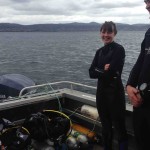
Sarah Powell
Marine Biologist
Institute for Marine and Antarctic Studies
I love how science is never-ending discoveries of the world we live in – the world we have lived in for generations, but still have so much to learn about. The ocean covers 71% of the surface of the Earth, and contains 97% of the Earth’s water. It’s something a lot of us see regularly, yet we never venture far beneath its surface. SCUBA diving has opened up a world I never thought much about up until a few years ago, yet all the weird and wonderful things you see on every dive quickly made me realise there is so much beneath the surface still to discover. Plus it’s such an adrenalin rush!
I haven’t always been into diving. I wasn’t sure what I wanted to do once I finished high school. I knew the sciences were my favourite subjects, and so after a year of travelling, I decided to go to university to study a Bachelor of Science. I started with broad first year subjects, and narrowed my choices down until I decided to major in Conservation and Wildlife Biology at Murdoch University in Western Australia. I decided to head in this direction with my studies as it involved lots of field trips and lab experiments, something that excited me much more than just sitting in lectures.
I ended up studying fire ecology in the northern jarrah forests of W.A in the final year of my degree, before obtaining my open water SCUBA certification and moving to Tasmania to pursue my new found passion of discovering what lived within our oceans. I’ve recently completed my masters at the Institute for Marine and Antarctic Studies (IMAS) in Hobart, on the timing of reproduction in southern rock lobster around Tasmania.
I have also gained my Scientific Diving certification through IMAS, which allows me to help out with all sorts of field studies with the university. This certification has opened up a whole new level of SCUBA diving that I’d never dreamed possible a few years ago. I now get to regularly dive in all sorts of places around the state, carrying out various field work needed by researchers.
Find out more: www.imas.utas.edu.au